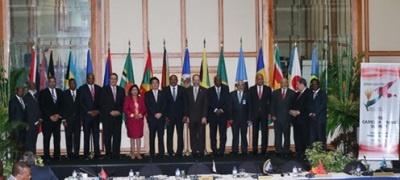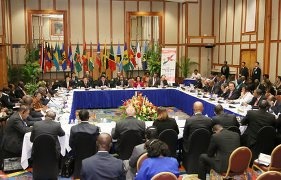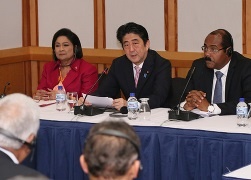Latin America and the Caribbean
Japan-CARICOM Summit Meeting
 (Photos: Cabinet Public Relations Office)
(Photos: Cabinet Public Relations Office)
 (Photos: Cabinet Public Relations Office)
(Photos: Cabinet Public Relations Office)
 (Photos: Cabinet Public Relations Office)
(Photos: Cabinet Public Relations Office)
Prime Minister Abe reiterated Japan’s strong ties with CARICOM member states, and presented Japan’s CARICOM policies consisting of three pillars. Following that, Prime Minster Abe actively exchanged views with the CARICOM heads of states, and the CARICOM member states welcomed Japan’s CARICOM policies, and in particular highly appreciated Japan’s understanding of the vulnerabilities particular to small island states, along with expressing expectation over Japan’s cooperation with challenges each of the countries face, including debt problems, hurricane damage and renewable energy.
- Japan’s CARICOM policies
The three pillars of Japan’s CARICOM policies stated by Prime Minister Abe are as follows:- (1) The first pillar is “Cooperation towards sustainable development, including overcoming the vulnerabilities particular to small island states.” In specific terms, firstly, Japan will participate proactively, in partnership with CARICOM member states, in international debate on the vulnerabilities particular to small island states. Secondly, Japan will draw on its technologies and knowledge to continue to enhance support in areas such as disaster risk reduction, the environment, energy, waste disposal, fisheries etc.. Thirdly, taking into account the “vulnerabilities particular to small island states” that CARICOM member states face and the importance of providing support from perspectives other than those based on per-capita income, Japan will conduct field surveys on future cooperation.
- (2) The second pillar is “Deeping and expanding fraternal bonds of cooperation and friendship.” Mutual understanding will be dramatically expanded through further tourism, sports or language study, which increased during the Japan-CARICOM Friendship Year 2014.
- (3) The third pillar is “Cooperation in addressing challenges of the international community.” In order to deepen cooperation and contribute to resolving the various challenges the international community faces, Japan emphasizes on strengthening cooperation and policy dialogue with the CARICOM member states, with which it shares the same values. Japan will contribute to the world from this perspective, based on its “proactive contribution to peace” policy.
During discussions that immediately followed the above, the attendees engaged in a lively exchange of opinions with a central focus on the First Pillar that was put forth by Prime Minister Abe.
The CARICOM member states expressed their gratitude for the support that Japan has provided to date, and highly praised Japan’s understanding with regard to the vulnerabilities particular to small island states. The CARICOM countries then stated that they are facing serious debt problems, but cannot receive the provision of concessional funds due to their income levels. The CARICOM countries commented that they require funds to address climate change and natural disasters such as hurricanes, but because they are facing debt problems, they do not have enough financial resources to engage in economic development, carry out the necessary social policies in order to improve the lives of citizens, and make domestic investments in the development of infrastructure. The CARICOM countries also mentioned other issues such as the need to address energy costs, which are hovering at high levels.
The countries then stated that they hope to get support, making use of Japanese technologies in fields such as renewable energy, energy saving, and disaster risk reduction, and noted that it is important to establish loan conditions. that take into consideration the circumstances of developing countries through governance reforms for international organizations. The CARICOM countries also conveyed their hope that Japan will raise their concerns at various international organizations. Furthermore, The CARICOM countries suggested that trade and investment ties with Japan should be strengthened and that Japan-CARICOM summit meetings should be held on a regular basis.
- In response to this, Prime Minister Abe stated that his understanding regarding issues related to the CARICOM countries, such as natural disasters and debt, had been deepened, and pointed out that a fundamental aspect of Japan-CARICOM relations is based on the commonalities that Japan also has many small islands and thus shares issues such as maritime safety. Prime Minister Abe then commented that it will be important to engage in even closer consultations going forward, and diligently responded to the problems mentioned by the CARICOM countries, saying that Japan would present the issue of the vulnerability of small island states in the international arena, consider cooperation in the areas that were proposed, and aim to realize more frequent summit meetings.
- Prime Minister Abe and the leaders of the CARICOM countries agreed that their countries are important partners that share fundamental values related to the realization of peace and prosperity in the international community based on rules. Taking the opportunity of the Japan-CARICOM Friendship Year 2014, the leaders then agreed to further strengthen friendly and cooperative relations going forward.
- Lastly, Prime Minister Abe stated that Japan will move ahead with fruitful exchanges and cooperation with the CARICOM countries in accordance with the policies that were put forth on this day, making use of the Japan-CARICOM foreign ministers’ meetings scheduled to be held this autumn, opportunities related to mutual visits by senior officials, and forums such as international conferences.
<Reference>
(Leaders in attendance from the CARICOM side)
| ・The Hon. Gaston BROWNE, | Prime Minister of Antigua and Barbuda (chair country) |
| ・The Rt. Hon. Freundel STUART, | Prime Minister of Barbados |
| ・The Hon. Roosevelt SKERRIT, | Prime Minister of the Commonwealth of Dominica |
| ・Dr. the Right Hon. Keith MITCHELL, | Prime Minister of Grenada |
| ・H.E. Donald RAMOTAR, | President of the Republic of Guyana |
| ・H.E. Mr. Michel Joseph MARTELLY, | President of the Republic of Haiti |
| ・The Rt. Hon. Dr. Denzil Llewellyn DOUGLAS, | Prime Minister of Saint Christopher and Nevis |
| ・The Hon. Dr. Kenny Davis ANTHONY, | Prime Minister of Saint Lucia |
| ・Dr. the Hon. Ralph E. GONSALVES, | Prime Minister of Saint Vincent and the Grenadines |
| ・The Hon. Kamla PERSAD-BISSESSAR, | Prime Minister of the Republic of Trinidad and Tobago |
| ・Amb. Irwin LaRocque, | Secretary-General of the Caribbean Community (CARICOM) Secretariat |
(Substitute attendees)
| ・The Hon. Frederick A MITCHELL, | Minister of Foreign Affairs and Immigration of the Commonwealth of The Bahamas |
| ・The Hon. Wilfred ELRINGTON, | Minister of Foreign Affairs of Belize |
| ・The Hon. Dr. Wykeham McNeil, | Minister of Tourism and Entertainment |
| ・H.E. Robert A. L. AMEERALI, | Vice-President of the Republic of Suriname |


 (86KB)
(86KB)